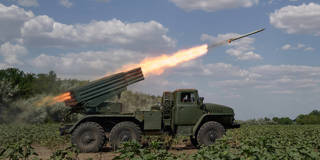For more than two years, Western governments have trickled weapons and ammunition into Ukraine and imposed financial and trade sanctions on Russia, sometimes with little coordination. The sooner they can embrace a collective strategy based on shared objectives, the better it will be for everyone.
STOCKHOLM – More than two years after Russia invaded Ukraine, the West, remarkably, still lacks a unified strategy. Though it has supplied desperately needed weapons and ammunition, it has done little else to address Ukraine’s needs.
What would an effective strategy look like? For starters, Western governments need to establish shared goals. Ukraine must expel Russian forces and recover all the territory that it has lost since 2014; Russia must be forced to pay war reparations to compensate Ukraine (the World Bank estimates that reconstruction will cost about $500 billion over the next decade); the thousands of Ukrainians who have been deported to Russia must be allowed to return; and the tens of thousands of suspected war crimes committed by Russian troops must be prosecuted and punished.
The West can no longer get away with promising to support Ukraine “for as long as it takes.” Rather than holding Ukraine back from attacking Russian strategic and military assets, it should welcome such strikes. Losing the war is the best thing that could happen to Russia. Historically, military defeats have usually led to reforms and a change in leadership – as happened after the Crimean War (1853-56), the Russo-Japanese War (1904-05), and the war in Afghanistan (1979-88). Vladimir Putin has re-introduced Stalinist-level repression and opted for eternal war, a project that is likely to end in his demise. While it is ultimately up to Russians to effect regime change, the West should welcome the prospect.

STOCKHOLM – More than two years after Russia invaded Ukraine, the West, remarkably, still lacks a unified strategy. Though it has supplied desperately needed weapons and ammunition, it has done little else to address Ukraine’s needs.
What would an effective strategy look like? For starters, Western governments need to establish shared goals. Ukraine must expel Russian forces and recover all the territory that it has lost since 2014; Russia must be forced to pay war reparations to compensate Ukraine (the World Bank estimates that reconstruction will cost about $500 billion over the next decade); the thousands of Ukrainians who have been deported to Russia must be allowed to return; and the tens of thousands of suspected war crimes committed by Russian troops must be prosecuted and punished.
The West can no longer get away with promising to support Ukraine “for as long as it takes.” Rather than holding Ukraine back from attacking Russian strategic and military assets, it should welcome such strikes. Losing the war is the best thing that could happen to Russia. Historically, military defeats have usually led to reforms and a change in leadership – as happened after the Crimean War (1853-56), the Russo-Japanese War (1904-05), and the war in Afghanistan (1979-88). Vladimir Putin has re-introduced Stalinist-level repression and opted for eternal war, a project that is likely to end in his demise. While it is ultimately up to Russians to effect regime change, the West should welcome the prospect.